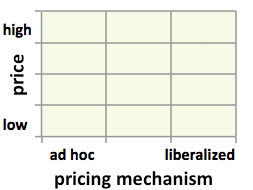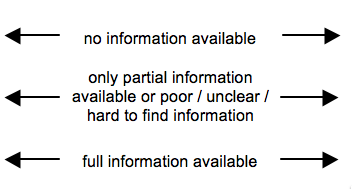Difference between revisions of "Fuel Prices Cameroon"
***** (***** | *****) |
***** (***** | *****) |
||
| Line 1: | Line 1: | ||
{{Fuel Price Factsheet | {{Fuel Price Factsheet | ||
|Fuel Price Country=Cameroon | |Fuel Price Country=Cameroon | ||
| − | |Fuel Pricing Policies="Automatic fuel price adjustments were suspended | + | |Fuel Pricing Policies="Pricing policy: Government operates a stabilization fund, Caisse de Stabilisation des Prix des Hydrocarbures (CSPH, Fund for Hydrocarbon Price Stabilization). Automatic fuel price adjustments were suspended following protests in Feb 2008 (see below) and fuel prices were lowered. Fuel prices were frozen until Dec 2008 when they were lowered, and have not been adjusted since. Government’s policy since 2008 is to compensate the national oil company’s refinery for the difference between the prices set by the formula adopted in 2007 and the administratively fixed prices. Government announced fuel price increases effective Jan 2012, but backed down after threats of a strike. A finance ministry official told Reuters that the events of 2008 as well as the protests in Nigeria in January 2012 against gasoline price liberalization ruled out subsidy cuts. |
| + | |||
| + | Protests: In Feb 2008, a strike by transport workers against high fuel prices and poor working conditions was followed by a series of violent demonstrations against broader political issues as well as the high cost of living. These protests left at least 30 people dead (official figure), while some have cited more than 100. | ||
| + | |||
| + | Consequences of subsidies: IMF reported that government had spent FCFA 146 billion (US$0.3 billion) in 2010 (1.3% of GDP) and FCFA 309 billion (US$0.65 billion) in 2011 (2.5% of GDP) on fuel subsidies, and subsidies in 2012 were expected to reach FCFA 400 billion (US$0.8 billion). Cumulative obligations and arrears to the refinery at the end of 2011 amounted to FCFA 445 billion (US$0.9 billion), or 3.7% of GDP. In Mar 2012, as part of the measure to clear the arrears, government agreed to cancel FCFA 87 billion (US$0.2 billion) worth of taxes due from the refinery in the second half of 2011." | ||
(Source: Kojima, Masami. (2013, forthcoming). “Petroleum product pricing and complementary policies:Experience of 65 developing countries since 2009.” Washington DC: World Bank.) | (Source: Kojima, Masami. (2013, forthcoming). “Petroleum product pricing and complementary policies:Experience of 65 developing countries since 2009.” Washington DC: World Bank.) | ||
Revision as of 13:04, 12 March 2013
Part of: GIZ International Fuel Price database
Also see: Cameroon Energy Situation
Fuel Pricing Policies
| Local Currency: | XAF |
| Exchange Rate: | 472.88
|
| Last Update: |
"Pricing policy: Government operates a stabilization fund, Caisse de Stabilisation des Prix des Hydrocarbures (CSPH, Fund for Hydrocarbon Price Stabilization). Automatic fuel price adjustments were suspended following protests in Feb 2008 (see below) and fuel prices were lowered. Fuel prices were frozen until Dec 2008 when they were lowered, and have not been adjusted since. Government’s policy since 2008 is to compensate the national oil company’s refinery for the difference between the prices set by the formula adopted in 2007 and the administratively fixed prices. Government announced fuel price increases effective Jan 2012, but backed down after threats of a strike. A finance ministry official told Reuters that the events of 2008 as well as the protests in Nigeria in January 2012 against gasoline price liberalization ruled out subsidy cuts.
Protests: In Feb 2008, a strike by transport workers against high fuel prices and poor working conditions was followed by a series of violent demonstrations against broader political issues as well as the high cost of living. These protests left at least 30 people dead (official figure), while some have cited more than 100.
Consequences of subsidies: IMF reported that government had spent FCFA 146 billion (US$0.3 billion) in 2010 (1.3% of GDP) and FCFA 309 billion (US$0.65 billion) in 2011 (2.5% of GDP) on fuel subsidies, and subsidies in 2012 were expected to reach FCFA 400 billion (US$0.8 billion). Cumulative obligations and arrears to the refinery at the end of 2011 amounted to FCFA 445 billion (US$0.9 billion), or 3.7% of GDP. In Mar 2012, as part of the measure to clear the arrears, government agreed to cancel FCFA 87 billion (US$0.2 billion) worth of taxes due from the refinery in the second half of 2011."
(Source: Kojima, Masami. (2013, forthcoming). “Petroleum product pricing and complementary policies:Experience of 65 developing countries since 2009.” Washington DC: World Bank.)
Fuel Prices and Trends
| Gasoline 95 Octane | Diesel | |
|---|---|---|
| in USD* |
|
|
| in Local Currency |
|
|
* benchmark lines: green=US price; grey=price in Spain; red=price of Crude Oil
Fuel Price Composition
Price composition.
At a Glance
| Regulation-Price-Matrix |
| ||||
 |

|

|

| ||
CSPH website down or non-existent.
Sources to the Public
Contact
Please find more information on GIZ International Fuel Price Database and http://www.giz.de/fuelprices
The following coordinate was not recognized: {{#geocode: Cameroon|google }}.



















